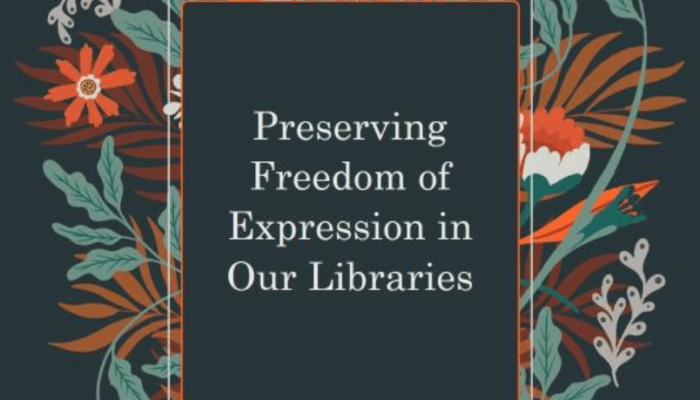This month, Trevor Deck walks us through the library’s collection development mandates, scope and goals.

Preserving freedom of expression in our libraries
By: Bessie Sullivan
Introduction
Ihave started this article countless times and reworked it even more times. My daughter tells me I’m trying to summarize in a few pages what could be a Ph.D. thesis. I have finally concluded that no matter how hard I try, I cannot write impartially about this topic. Daily, I find further opinions and debates in mainstream media. Every time I think I have come up with the ultimate theory, someone comes along to dispel it. I’ll be clear from the outset that I am not an academic, even if my daughter wishes otherwise. I’m a librarian who has spent the past 24 years working in public libraries. I do view myself as a thinking person, but nothing I write would stand up to academic rigour. Take this for what it is: the musings of a frustrated library professional who has seen a dramatic rise in attempts to erode freedom of expression within public libraries.
Libraries as Champions for Social Justice
Because of our commitment to equity, diversity, and inclusion, public libraries have been thrust onto the front line of the fight for social justice. All public libraries in Ontario are facing increased scrutiny of collections, programming, and even who we rent rooms to. This pressure is coming from both sides of the political spectrum. One side thinks that public libraries should be a safe space; this manifests itself in requests to remove content that is racist, sexist, ableist, homophobic, etc. The other side feels that it is their moral duty to prevent anyone from having access to anything that is outside of their belief system.
Despite the fact that no one is being forced to attend a program or read the book, both sides want to prevent anyone from accessing the information. I understand that the first group wants to protect marginalized people from further hurt, but even if we understand where it is coming from, the request still equals censorship. The second group is trickier for me, probably because I neither understand nor agree with them. I want to find logic explaining why people feel the way they do, but I am struggling with the fact that, from my perspective, there is no logic to be found.
These sentiments are not mine alone; drag performer Betty Baker had an “Aha!” moment when reflecting on a Drag Queen Story Time that attracted protestors in Peterborough:
“…these protests weren’t about drag or story time. They’re about power and control of knowledge.”
If I operate from the premise that some people deeply fear the unfettered access to knowledge and what that will do to the status quo, I can stop looking for logic. I can understand that the issue is much deeper than the illogical arguments presented.
From whatever direction the pressure is coming, we are all having to look at our policies and ensure that they are as strong as possible. In the absence of any real legislation, we rely heavily on our policies to both guide and explain how we make decisions.
Recently, Ottawa Public Library updated its Intellectual Freedom Position Statement, emphasizing that library users continue to have unrestricted access to any information as long as it is legal, according to Canadian courts.
From the article, Wendy Wright, the chair of the Canadian Federation of Library Associations’ intellectual freedom committee, says:
“Libraries have a core responsibility to safeguard and facilitate access to constitutionally-protected expressions of knowledge, imagination, ideas, and opinion, including those which some consider unconventional, unpopular or unacceptable.”
There are items in all our collections that, as individuals, we may find unacceptable. I had a colleague with a strong background in science who had difficulty stocking certain self-help books, especially those that presented non-scientifically proven treatments for serious illnesses.
In an opinion piece written in reaction to the Ottawa Public Library’s renewed commitment to intellectual freedom, the writer takes umbrage with someone using the term “nut job” in a children’s book. As a person who has struggled with mental health issues, I agree that the language is less than ideal. The writer goes on to say that we wouldn’t tolerate racism, antisemitism, etc., in books at the library, so why would we tolerate ableist language? Truthfully, we do tolerate all of those things and more. Casual racism and sexism are rampant in our culture and can be found reflected in our writing. This is not justification for discriminatory language but an acceptance that it exists and exists in our collections. Additionally, our sensitivity to vocabulary changes as we evolve. Words that were acceptable even ten years ago are not now rendering our collections problematic on a rotating basis.
Book Banning
The Washington Post recently published an article about book challengers.
There were many interesting things in the article, but for me, these are the highlights:
1. The article references a group called “Moms for Liberty.” While I do not agree with their stance, I can appreciate the fact that they have actually read the content they are challenging. What I’m seeing in Canada is the same titles being challenged, but nobody has actually read the material. They are simply parroting what they have heard others say, some of which is factually incorrect.
What really irks me about groups like “Moms for Liberty” is that they have co-opted terms like “liberty” and “freedom” when they mean the exact opposite.
Of this, Wendy Wright says:
“The irony of censorship in the name of parental rights is that one parent demanding the removal of a book or program from a library infringes on the rights of other parents who approve of access for their children.”
2. The majority of complaints are coming from a small group of people. I see this locally as well; my fear is that we are allowing the noisy minority to drown out what the majority believes.

Conclusion
I’ve been contemplating legislation that bans book banning. One example is found in Missouri, where censoring books will jeopardize your funding. This is probably the most effective way to ensure that public libraries don’t waver in the face of pressure. However, we need more support than that. Our boards and municipal politicians must be united, aligned, and supportive of our service. When they aren’t, the political climate created makes libraries trying to champion Equity, Diversity, and Inclusion, while maintaining freedom of expression, almost impossible to achieve.


